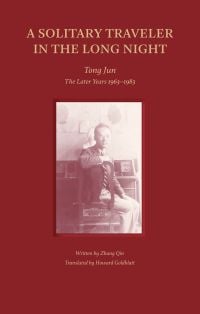
A Solitary Traveler in the Long Night by Qin Zhang with Eugene Wang and Stephen Kennedy Smith
22 Jan 2025
Zhang Qin on the life of Tong Jun, a renowned architect and architectural educator in contemporary China. In conversation with Eugene Wang, followed by a signing.
PLEASE NOTE: RSVPs are encouraged but not required. Seating is limited and will be first come, first served. Doors open at 5:30 pm. RSVP and see more details here!
Can’t attend? Order your signed copy (please specify that you would like it signed in the comments box at checkout).
Praise for the book:
“Tong Jun was an architect of substance who made many significant contributions. He excelled as a scholar and practitioner. In A Solitary Traveler in the Long Night, Zhang Qin provides considerable details about his life from 1968 to 1983. It is a valuable resource for anyone interested in Chinese architecture or architecture more broadly.” -Professor Frederick Steiner
“It is such a personal account, and beautifully translated. I had read a lot of Tong Jun’s writings and certainly know more about him than the average reader. For someone who doesn’t know him, it tells a moving personal story far beyond the life of an architect.” -Professor Nancy Steinhardt
Zhang Qin graduated from Southeast University with a bachelor’s degree in architecture and went on and obtained her master’s degree and doctorate from Tongji University. She has engaged in the protection of urban historical and cultural heritage for many years and has been presented with many awards by the Chinese government and UNESCO. In 2015 she delivered a keynote speech on China’s urban heritage protection at the opening ceremony of the 16th Annual Conference of International Organizations of National Trust, Cambridge University, United Kingdom.
Eugene Y. Wang is the Abby Aldrich Rockefeller Professor of Asian Art at Harvard University. A Guggenheim Fellow (2005), he is the art history editor of the Encyclopedia of Buddhism(2004). His extensive publications range from early Chinese art and archeology to modern and contemporary Chinese art and cinema. His book, Shaping the Lotus Sutra: Buddhist Visual Culture in Medieval China (2005), explores Buddhist worldmaking; it received the Sakamoto Nichijin Academic Award from Japan. His current research focuses on cognitive study of art and consciousness as well as biocentric art that integrates visual, biological, and ecological systems.
He is also the founding director of Harvard CAMLab that explores the nexus of cognition, aesthetics, and mindscape. The CAMLab projects he heads explores multimedia storyliving and immersive artistic-cum-spiritual experience, integrating humanistic research and sensorial media practice. CAMlab’s current projects include Digital Gandhara, a massive mapping of Buddhist sites in Afghanistan and Pakistan, and Shadow Cave which probes the enduring cognitive model behind Asian Buddhist caves.
Stephen Kennedy Smith is a lecturer at the Sloan School of Management as well as a fellow at the Connection Science Group at MIT. He received his BA from Harvard University, JD from Columbia University, and EdM from the Harvard Graduate School of Education. He has served on the staff of the Senate Judiciary and Foreign Relations committees and is a three-time recipient of the Danforth Award for Excellence in Teaching at Harvard University. He continues to be active in Democratic politics and lives in New York City. He is the co-author of the recently published book JFK: Vision for America (Harper Collins).
Please log-in or create an account to see your recent items.